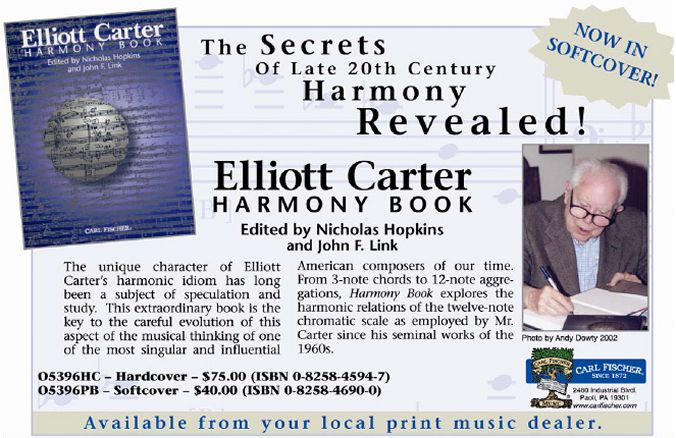|
|
Your
Ad Here!
Send Email to: publisher@newmusicon.org |
|
|
Your
Ad Here!
Send Email to: publisher@newmusicon.org |
CONTENTSPUSHING THE ENVELOPE:
The New Music Champion
Award, 4 THE HONOREES, 5 ALL ON BOARD, 6 LIVE EVENTS Clothed
in a Redemptive Tale (Paulk on Heggie), 10
DOTTED NOTES from … Kroll, Pehrson, BLC, 17 LEGATO NOTES:
More on Board, 19 THE SCOREBOARD:
THE CINEMA;
RECORDINGS: Mixing History and
Mystery Electronically (BLC on Martin Gotfrit),
24 RECENT RELEASES, 25 COMPOSER INDEX, 25
BRAVI TO …, 27
THE PUZZLE PAGE: |
More Thoughts on War and PeaceBy BLC ©2004 'Women and War' ('War & Pieces #3'). Katherine Hoover: Quintet Da Capo (1989) ~~ David Hollister: "Homeless Children" (1989) ~~ Songs and instrumental works by Barber, Weill, Blitzstein, Spektor and Suskind. Downtown Chamber & Opera Players/ Mimi Stern-Wolfe, music director; guest singers and instrumentalists. St. Mark's Church in the Bowery, NY, NY. March 28th. 'War and Pieces' is yet another ambitious series conceived and produced by the DC&OP under Mimi Stern-Wolfe's direction. Having received deserved acclaim for her Benson AIDS series and her programs dedicated to the composers of the Holocaust, 'War and Pieces,' too, seeks to remind us through music of major human events without dwelling too much on the theme of humankind's inhumanity to humankind but still tugging at our emotions. Admittedly, this is but the second program we attended which touches on that theme, the other being the one that featured the understated but powerful song cycle by Richard Peaslee sung by three male performers. Still, this series and particularly the theme of war and its human face hasn't moved this reviewer as much as "Benson" and "Holocaust." Why so? Well, perhaps because war is more than a subject — it's the crux of so much art. After all, conflict and resolution, struggle and accord, anger and love, pain and ecstasy — don't these ideas appear in all art with any meaning? So if Mimi needs an excuse to cover the music that moves her, that's perfectly okay with us. On this very occasion, we heard one work of music that did indeed move and impress us, and the composer was right there to talk about it - a living, vital human being who can still be considered important for what she does right now in this world of ours and not for any image preserved in the aural museum known as the concert hall. Katherine Hoover wrote her Quintet Da Pacem for piano and string quartet 15 years ago on a commission from the New Jersey Chamber Music Society, which premiered it at Alice Tully Hall and successfully recorded it in 1996. (Leslie Gerber picked it as one of the five best CDs that year.) Its roots could not be any more fitting for the venue and the occasion. The composer says she came across a simple canon by Christoph Demantius (1567-1643) with the opening words, "Da pacem, Domine, in diebus nostrus" ("Give us peace, o Lord, in our lives"). Hoover's work, divided into two parts, Adagio-Allegro and Fantasia, opens with a hymn-like passage, drawn from the original motives, followed by a faster passage (a la Handel, et al) with ideas from the opening. It is very Baroque, indeed. Ah, but then comes the fantasia and we are in modern times. This lengthy movement is made up of exquisitely crafted ideas based on that original canon. Within the rich textures is the carefully incorporated "sound of a mourning dove." Strong suggestions of suffering follow as the microtonal sliding and the pizzicati sound unmistakably like pain and weeping. The original canon returns at the end in a long, slow morendo that some might see as a response from God to our pleas. At 27 minutes the lengthy work, so earnestly performed by the Colorado Quartet, was bound to draw some negative comments from other attendees I spoke with and this, too, does not let us forget the time we live in. We have become an impatient lot always in a hurry to get on with it. Yet if this piece were played as part of a church service, surely no one would have complained about its length. While Ms. Hoover was writing Da Pacem, David Hollister composed his elegiac "Homeless Children," to a poem by Ilsa Gilbert. In this afternoon's setting it worked better for us than it had on other occasions. The first two lines of Ms. Gilbert's text say it all: "War is the day they are born/And peace is the day they die." We must observe that the chamber cantata Peace Cry, from which the song is drawn, was dedicated to Hollister's grandfather Frederic, a man of the cloth who preached against American participation in World War I. Much of David Hollister's work displays similar pacifist/leftist leanings, sometimes even anti-church sentiments if the church happens to be on what he considers the wrong side. Another reason the work moved us this time must surely be attributed to the fine singing of Carolyn Grondlund and the vibrant playing of cellist Dan Barrett and pianist Stern-Wolfe. Overall, the singers and players were in top form for the occasion. Ms. Grundlund again stood out in Samuel Barber's lovely Dover Beach (1933), as did contralto Jeanine Otis in Marc Blitzstein's "Joe Worker Gets Gypped" (from The Cradle Will Rock) and baritone Sean Barker in Mira Spektor's "Where Are the Children" (from Lady in the Castle). There was admirable vocalizing by soprano Isabelle Ganz in Kurt Weill's "Was bekam des Soldaten Weib" (1943) and with Mr. Barker in the "Mission Scene" from 'Cradle'). They were very nicely accompanied by pianist Mimi and by Mr. Barrett and flutist Margaret Lancaster in the Spektor selections. The Colorado was also featured in the Barber; it comprises violinists Julie Rosenfeld and Deborah Redding, violist Marka Gustavson and cellist Diane Chaplin. |
